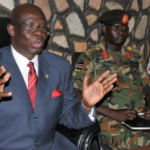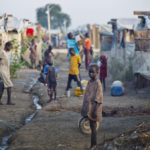About three thousand South Sudanese fleeing violence in their country sought refuge in Uganda from July 15 to July 17, an average of about 1000 people a day.
According to the United Nations High Commissioner for Refugees (UNHCR), a total of 1,326 crossed into Uganda between Friday and Saturday, with 1,633 more arriving on Sunday.
‘The number of people seeking shelter and safety in Uganda from South Sudan has risen significantly in the past few days and we believe the influx will keep growing in the days ahead as tensions remain high across the border,’ the UNHCR states, adding that prior to last Friday, the average daily rate was 233.
‘These new arrivals bring the total number to have fled to Uganda since the latest violence in South Sudan began on July 7 to 5,015. More than 90 per cent of the new arrivals were women and children under the age of 18 years,’ the UNHCR notes.
According to the humanitarian agency, more people are expected to flee to Uganda, following the clearing of checkpoints along the 200-kilometre Juba-Nimule road that links the South Sudan capital to Uganda.
The new arrivals are mostly fleeing from Eastern Equatoria state, with a smaller number arriving from Juba.
‘Thousands of people have entered Uganda’s northern region via the border crossing points at Moyo, Kuluba, Lamwo, Yumbe and Elegu, while some are heading directly to Kiryandongo refugee settlement in the mid-west of the country. The border was previously closed on the South Sudan side, but restrictions have been eased,’ UNHCR adds.
Inside Uganda, more than 6,000 South Sudanese are staying in the Pagiarinya settlement in Adjumani District, while others are waiting at collection points to be transferred to the settlement. A recent evaluation found that Pagiarinya has capacity for another 6,500 people, meaning it is likely to be full within a few days.
An inter-agency site assessment mission, including officials of the Uganda Prime Minister’s office and UNHCR, are currently visiting sites to identify areas suitable for establishing new settlement areas, the UNHCR says.
The UN has said that at least 300 people were killed and over 10,000 fled their homes after the violence in Juba, and according to the UNHCR, as part of the overall humanitarian response, it is undertaking assessments and providing assistance in displacement sites.
Although a fragile ceasefire has held since late Monday, the United Nations has warned of the possibility of fresh fighting in Juba. The situation is being exacerbated by the devaluation of the South Sudanese pound, leading to skyrocketing prices and making the food that is available too expensive for many. The fighting also disrupted supply routes from Uganda into South Sudan, including aid and food.
About two weeks ago, the world’s newest country exploded into violence after troops loyal to South Sudan President Salva Kiir Mayardit fought with those allied to First Vice President Riek Machar.
And last Friday in Nairobi, UNHCR presented a revised appeal for its South Sudanese refugees operations, seeking US$701 million. The earlier appeal for US$638 million was only 17 per cent funded.
Presenting the appeal, Ann Encontre, Regional Refugee Coordinator for the South Sudan situation, said the overall planning figure had risen from 867,239 refugees to 973,000. She warned that it could pass the 1 million mark in the coming months.








